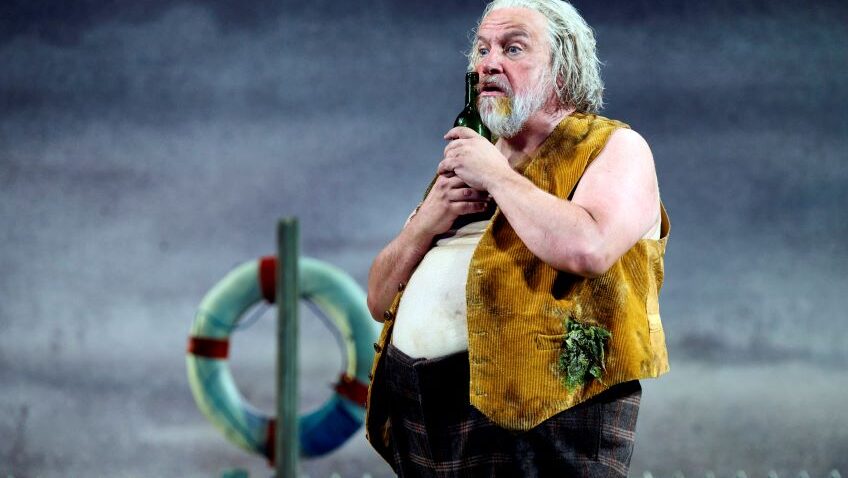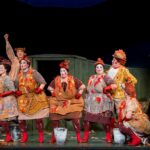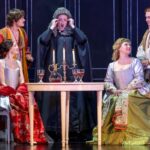Warmth, colour, breezy humour and charming loveliness ride high in Opera North’s Falstaff, in which the fine, rounded baritone – and even more rounded belly – of main man Henry Waddington give fat knight Sir John a pleasing balance of repellent obnoxiousness and likeable, ridiculous self-delusion.
Verdi (1831-1901) adored Shakespeare, though he knew his works only in Italian, and amongst his own 28 revered operas sit the dark, tragic dramas of Othello and Macbeth. Full of love, passion, villainy and murder, they run the gamut of complex, fluctuating human emotions and our ambiguous capacities for good and evil, providing great operatic material. Unlike the bard Verdi hardly ever went for comedy, but in his seventies he was persuaded by young librettist Arrigo Boito to get audiences laughing again at long last with Falstaff. The work, which premiered at La Scala in 1893, turned out to be his last.
Sir John Falstaff is Shakespeare’s most popular comic character. He appears in The Merry Wives of Windsor as a fat, selfish, lecherous, hard-drinking buffoon who’s always broke and scheming to charm money out of whoever he can, while as dodgy companion to Prince Hal in Henry IV (I and II) he’s a slightly more rounded character. Verdi and Boito take their rollicking, farcical plot from The Merry Wives but the dissolute Falstaff is given some of that fuller depth, too: along with his playful wit and zest for life come a little more vulnerability and emotion. In addition, Opera North has catapulted him from Tudor times into the 1980s.
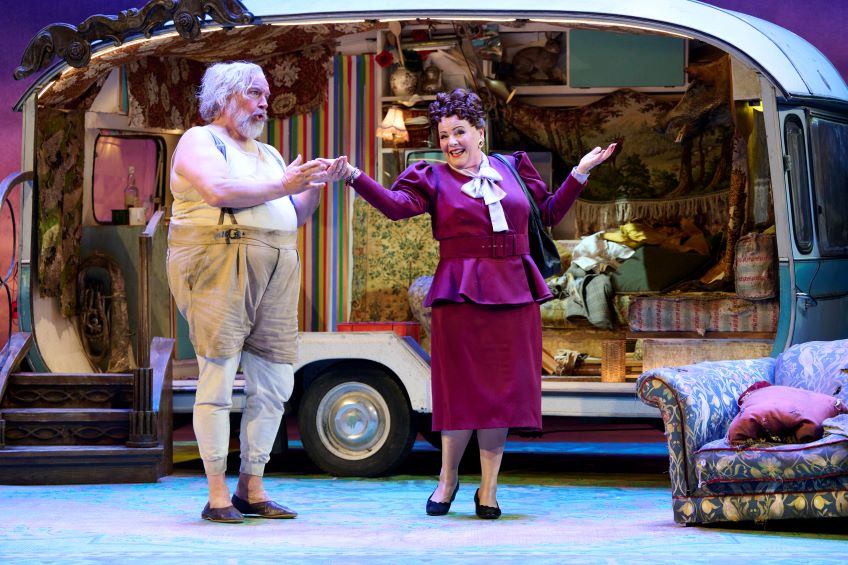
Without overture or preamble, a curtain of colourful, seaside-bright strips rises and voila a dishevelled Sir John, slouched on a shabby armchair throne, set atop a pile of junkyard debris and booze in the company of his wide-boy cronies, Pistol, Bardolph and Robin. In tatty vest, grimy shorts, wrinkled long-johns and a straggle of white hair and whiskers, he’s a lazy down-and-out, a feckless drinker, a shameless petty thief and selfish womaniser, a fat, boastful, vain Mr Toad who deludes himself he’s a handsome, desirable, princely charmer. All this Henry Waddington achieves with fine presence, ludicrous corpulence and twinkling panache.
From start to finish this is a farce of great silliness, in which fanciful, degenerate Sir John sets out – with great incompetence – to pay off his crippling debts and buy more booze by seducing two wealthy, tennis-playing Windsor wives, elegant Alice Ford and Meg Page (sung with sparkle and determined merriment by Kate Royal and Helen Evora). Physical and visual comedy abound in plots, counterplots, disguises, delusions, deceptions and confusions with an added bonus of having the entire cast, including helmeted, truncheon-brandishing bobbies, tool-toting gardeners and a chef with rolling-pin, chase round a bedroom as the profusely sweating Falstaff hides in a laundry basket that gets chucked in the river.
Much amusement stems, too, from Leslie Travers’ uplifting set and props: a small, squalid, grubby caravan (locally sourced and pre-loved) rotates to present the jumbled interior and messy exterior of Falstaff’s home, with many humorous touches along the way from dartboard, cool-box, stashes of cans and bottles, antler bottle-opener, antler chandelier, taxidermied stag and fawn, cock-eyed lampshades, parasols and a broken-down sofa full of dusty cushions. The 1980’s tennis club with nets, umpire chair and ladies in tennis garb elicits further smiles, while cloudy skies and elegant windows and bedroom add beauty.
With the industry’s Theatre Green Book guide putting a common sense emphasis on sustainability and a greater recycling of set, costume and prop components, this is the first of Opera North’s “Green Season” productions – though no-one would guess if they weren’t told since the quality and sparkle onstage are compromised not a jot. Indeed, the most stunning sight of the evening (apart from Falstaff’s big belly) is the great oak tree in the final scene, created from the massed branches of intricately beautiful antlers, shed by stags on the nearby Harewood estate. No pretend tree could be more artistically glorious or create more magical beauty.
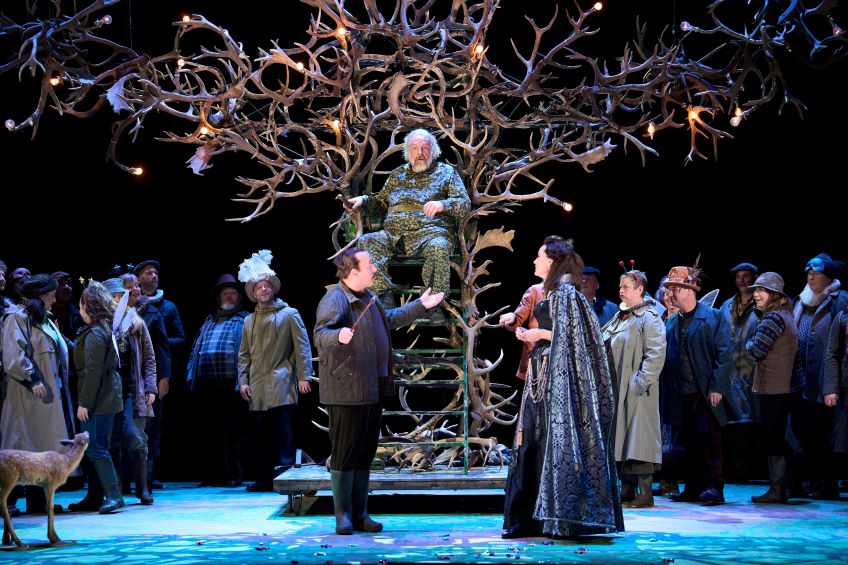
Amanda Holden’s English translation tells this pacy, linear story in plain, simple conversational style narrative (with the odd swear word). The pinnacle comes when she rhymes, “you’re in danger” with “hydrangea”. Nice! Maybe clonky, forthright English is more appropriate for the bizarre goings-on in Windsor than the charming flow of beauty that is the Italian language!
With comedy requiring a different style of music from tragedy, big, dramatic, emotional arias are less appropriate, and Verdi creates lighter moods and colour via music with energetic, wispy wit and comedic timing, and chattering Gilbert and Sullivan moments occur more than once. The loftier aria of young Fenton (sung with feeling by tenor Igor Zhuravskii) as he waxes poetic over his true love, Nannetta Ford (sweet soprano Isabelle Peters) is soon swept aside as comedy takes over again. Meanwhile, tenor Paul Nilon does an impressive job of presenting Dr Caius as a shrinking, hopeless, clumsy nerd in a sports jacket, Richard Burkhard’s fine voice and presence make him properly engaging as Ford, later disguised in Stetson and sunglasses as a Texan tycoon, and Louise Winter’s mezzo lends pleasing weight, wit and warmth to the busy, matronly Mistress Quickly, Nanetta’s governess.
As ever, Garry Walker’s orchestra sparkles in bringing alive both comic episodes and more earnest moods, and the marriage of score with the cast’s comic antics and song delivery works really well throughout. With the singing all-round strong, the fugal finale proves to be absolutely fabulous. In Tutto nel mondo e burla – Life is a Burst of Laughter Verdi’s phrases are taken up in staggered sequence by the entire cast of singers and, as the music weaves in and out, heads and bodies pop in and out through the shiny, brightly-coloured strips of the long curtain, clad in their motley, bizarre outfits – fairy wings, monk’s robes, woolly hats, flat caps, pullovers, feathers, ruffs, anoraks, bridal gowns… It’s brilliantly exhilarating and most delightful.
Eileen Caiger Gray
Performances continue in Leeds until Oct 25th. Then the production tours to Newcastle, Nottingham and Salford, alongside a new production of Puccini’s La Rondine and the brand-new show Masque of Might, created by Sir David Pountney by “repurposing” the music of Purcell.
You can find more information on the Opera North website by following this link.

